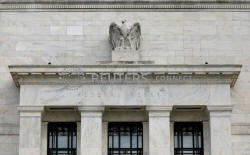Analysis: Fed may need more than words in next battle with markets
 Send a link to a friend
Send a link to a friend
 [March 03, 2021] By
Dhara Ranasinghe [March 03, 2021] By
Dhara Ranasinghe
LONDON (Reuters) - Federal Reserve: 1, bond
markets: 0. That's more or less where it stands after Round One in the
tussle over borrowing costs. But Round Two, and perhaps even Round
Three, are inevitable, and they may require policy action rather than
just words.
February's bond selloff sent U.S. 10- and 30-year Treasury yields more
than 30 basis points higher while governments from France to Australia
saw their borrowing costs jump. Stock markets, which for years surfed
the cheap-money wave, tumbled.
The selloff was driven by concerns that adding enormous buckets of
government spending to a fast-recovering U.S. economy would push
inflation above the Federal Reserve's target sooner than anticipated.
In theory, that would force the Fed's hand in raising interest rates,
wiping out investors' bond market returns.

In reality, a lasting inflation rise is likely years off -- Fed boss
Jerome Powell reckons three years. Central banks have also repeatedly
indicated they will keep rates below inflation.
Reiterating such messages, alongside interventions by smaller central
banks such as Australia and South Korea, calmed bond markets. Bets on
early-2023 Fed rate hikes have ebbed.
Graphic: Calm returns to bond markets but for how long? -
https://fingfx.thomsonreuters.com/
gfx/mkt/qzjvqglrxvx/Bonds0203.png
But perhaps markets are regrouping before another assault.
"Fed members have signalled they are not worrying, so the bond market is
saying: 'If this is not your pain point, we're going to find out what
is'," said Matthew Miskin, co-chief investment strategist at John
Hancock Investment Management.
Markets facing off against central banks is nothing new and the old
adage "Don't fight the Fed" still holds. But market clout has grown too.
As of 2019, funds' assets worldwide totalled $89 trillion, dwarfing the
combined $25 trillion balance sheet of the biggest central banks and
surpassing global economic output.
Graphic: Central bank balance sheets -
https://fingfx.thomsonreuters.com/
gfx/mkt/jbyprdwoepe/balancesheets.PNG
Central bank stimulus that crushed borrowing costs to below inflation
has fed an equity bull run that has added $64 trillion to the value of
global stocks since 2008. Higher yields would put that entire edifice at
risk.
The shifting power balance became evident in 2013 when a market tantrum
forced the Fed to backtrack on plans to start withdrawing stimulus.
Another market revolt erupted in late 2018, egged on by then President
Donald Trump. The Fed soon pivoted from raising rates to cutting them.

So markets have seen this movie before.
But this time there is a plot twist: Central bank stimulus, aimed at
lifting growth and inflation, has helped boost stock and bond prices,
but now government spending on top of that could fuel price pressures -
which hurt bonds and stocks.
Salman Ahmed, head of global macro at Fidelity International, expects
another selloff when the $1.9 trillion stimulus starts to trickle
through the U.S. economy.
Yields 25-40 bps above recent highs would worry the Fed, he believes,
adding that words won't placate markets next time. Instead they may want
bond-buying increased or Japan-style yield curve control (YCC) to stop
borrowing costs rising above a set level.
[to top of second column] |

The Federal Reserve building is pictured in Washington, DC, U.S.,
August 22, 2018. REUTERS/Chris Wattie/File Photo/File Photo

"This was probably one of the first market tantrums," Ahmed said. "If it
happens again and again, the Fed will have to go for YCC."
TIME OUT
What happens in sovereign bond markets matters because higher yields
here raise borrowing costs for companies and households. As capital flow
slows, so does economic growth.
And higher yields are harder to stomach in a world that has racked up an
additional $70 trillion rise in debt since 2013.
The selloff in the $21 trillion Treasury market reverberated globally --
German yields climbed 26 bps; Australian and Japanese yields rose above
levels targeted by policymakers.
The European Central Bank, fearing the impact on the bloc's anaemic
economy and inflation, warned investors not to push yields too high,
unless they want to fight its one trillion-euro war chest.
Graphic: The ECB's pandemic stimulus programme -
https://fingfx.thomsonreuters.com/
gfx/mkt/bdwpknmxxvm/Pasted%20image%201614683747706.png
AXA Group chief economist Gilles Moec said the ECB had been economical
so far with its emergency bond buying scheme, so "there is plenty of dry
powder to resist market pressure."
Economists suspect it has already escalated bond-buying, leading to
yields falling back this week.
Fed action, though, may be triggered only by a prolonged rout which hits
companies and lifts mortgage rates.

"It would be some combination of interest rates, equities, the dollar
and corporate spreads," said Ritchie Tuazon, fixed income portfolio
manager at Capital Group.
Graphic: US mortgage rates picking up, not surging yet -
https://fingfx.thomsonreuters.com/
gfx/mkt/xegvbwgrxpq/
USmortgages0203.png
ROUND 2?
A test could come next week when the U.S. Treasury auctions three- and
10-year bonds, following a recent debt sale that saw lacklustre demand.
But what investors want to see is how much additional Treasury borrowing
will be needed when the fiscal stimulus package goes through.
ING Bank predicts U.S. Treasury issuance at around $4 trillion this
year, versus $3.6 trillion in 2020. The Fed's monthly purchases
currently total $120 billion.
"As we do more stimulus, we will issue more U.S. Treasuries, so if the
Fed doesn't increase quantitative easing they are in essence tapering,"
Miskin of John Hancock said.
The other trigger could be robustly improving U.S. economic data,
especially employment figures.
"We are still in the winter of economic discontent, and in a few
quarters we'll be in the summer of economic euphoria," said David Kelly,
chief global strategist at JPMorgan Asset Management. "Which means that
rates go higher."
(Reporting by Dhara Ranasinghe, Sujata Rao and Mike Dolan in London and
Kate Duguid in New York; Editing by Hugh Lawson)
[© 2021 Thomson Reuters. All rights
reserved.] Copyright 2021 Reuters. All rights reserved. This material may not be published,
broadcast, rewritten or redistributed.
Thompson Reuters is solely responsible for this content. |